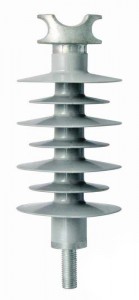Polymer Insulator (composite) is an electrical device consisting of insulation section made of polymer materials and metal fittings.
How it is made :
The insulation unit is made of fiberglass. The protective ribbed mold is made of silicon organic rubber. Flanges are made of anti-rust alloy thus providing safe long-term operation under various climatic conditions.
- Insulation section – an element bearing mechanical and electric loads and consisting of insulation core unit covered with protective mold.
- Insulation core unit – a rod made of composite dielectric substance – fiberglass, as a rule (tar reinforced with fiberglass) or consisting of separate elements assembled at the unit in a particular order.
- Insulator fittings – flanges (end terminals) and screen fittings.
Specifications.
- Simple maintenance. No necessity in washing of insulation during the entire service lifespan when mounted in recommended areas of pollution.
- Light weight (3-5 times lesser than the porcelain counterpart)
- Hydrophobic properties and anti-pollution design.
- High shock resistance
- Seismic and moist-discharge properties
- High resistance to torsion and flexure
- Vandal-proof design
- Safe coupling between flange and fiberglass rod (patent No 2173902, international application under the PCT, No PCT/RU02/00239)
- Application of organic-silicon rubbers produced by the world leading manufacturers with designed out-doors service life of at least 30 years
- No brittle failure and ten-fold mechanical FOS (factor of safety)
- Dielectric strength exceeds 40 kV/cm – as a result of a solid fiberglass rod application.
- Flanges are manufactured of substance not subject to corrosion (aluminum and zinc alloy).
Advantages of Polymer Insulator.
- Low costs (or no necessity at all) for Insulators cleaning.
- No need of zero value check.
- Light weight, easy and economical to transportation and installation.
- Not brittle, and reduce the purchasing quantities for spare parts.
National Switchgears is Manufacturer & Supplier Of Polymer insulator


